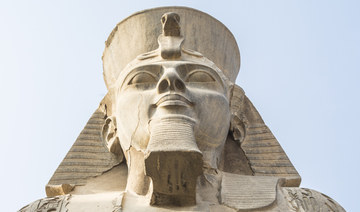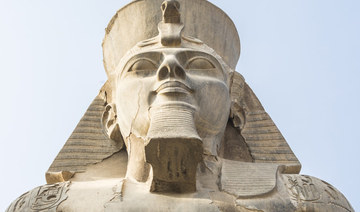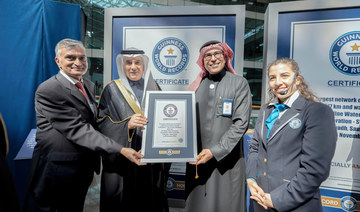Saudi national Hanan Faiz Al-Shehri is a one-of-a-kind exponent of yoga. Yoga is a collection of physical, mental and spiritual practices or disciplines which came from ancient India. Its concepts are known to many, but not many are adventurous enough to try it. At a session at her studio in Jeddah, she explained to Arab News the power of breathing.
She taught the class how to breathe in a way that relaxed their bodies. It was intense and required someone who is truly dedicated. Going by the response she is getting, it is easy to say that yoga is catching on in Saudi Arabia.
One wonders how the quintessential Jeddawi got into yoga. “It started,” Hanan explained, “by my being in a state of utter loss at a certain time of my life and I was watching the Discovery Channel with my dad. I was mesmerized by a kid, aka Buddha Boy, who was attempting a seven-year meditation.”
“It blew my mind how this person could just let go of everything known to him and commit to meditate and only meditate. I had been doing simple yoga on a daily basis, so it became a part of my lifestyle. It was a discipline I needed at the time. I looked over at my dad and said, ‘I’m going to Nepal.’ He saw the look on my face and knew I wasn’t joking. Twenty-four hours later, I was boarding a plane to Nepal.”
On arrival in Nepal, she was treated as a foreigner. “But the next day, I let go of all that and my guide took me to my first abode; it was something I never thought I’d experience. Seeing my new accommodations, all I could think to myself was ‘This just got real.’ My room was very small with only a mattress on the floor, some sort of bathroom and a window. That’s it! The whole purpose of being there is to learn to find yourself, through a spiritual path, channeling your positive energy and concentrating on the positive aspects of your life. It was the trip of a lifetime.”
Hanan said she had not always been an outgoing and adventurous person.
“I had some superficial life goals but I’d always leaned toward helping people. When I graduated from high school, I told my parents that I wanted to help people so I got a degree in nursing. A few years after that I moved into the corporate world and was engulfed by it. I kept moving up until I reached what I thought at the time was the peak of my success. Inside, however, I felt there was more to life than superficial surroundings. Nepal happened at that time; my whole perspective on life shifted and I have no regrets,” she said.
Hanan wanted to learn more and the only way was to get certified.
“I went to India and stayed for a month and a half at the Ashtak Yoga School. I was in a course so intense that you barely had time to do anything. For 12 hours a day, you meditate, do yoga and study. It’s not playing; it’s an aggressive and comprehensive curriculum.”
Yoga isn’t for everyone. In order to move forward in such a spiritual field as yoga, it requires not only time but tenacity and a drive to learn more.
“Yoga is not just movements and poses; it’s learning the proper techniques, perfecting them and knowing precisely how to perform them. At the same time, you let go of the negative, the bad, the ugly, the superficial and getting in tune with your inner self which is often lacking here.”
Did Hanan have a difficult time returning and helping society to get to know Hatha and Vinyasa Yoga? “Ironically it’s not society that is worrying but other trainers in your field. The first thing I always tell visitors is that we are all equal here; there is no hate and there is only peace. That is the essence of yoga, peace. What you encounter in the world is often not only disappointing but infuriating. There is too much competitiveness and you lose the true essence — peace, love, calmness — of becoming a yogi and an instructor. There was so much hate from outsiders and yet my students have shown enough love and appreciation to overcome the hate ten-fold. The reason is because I am good and confident enough to say it. I don’t need to be a part of an elite group to know how good I am; my training has taught me that I neither need it nor want to be a part of it,” she said. “To breathe is what I teach my students for just a couple of minutes; we train together as one, breathe together as one and let go of our baggage as one. No social classes, no nationalities, nothing. We are beautiful strong women and that’s what it is.”
The power that comes through breathing is an important aspect of her training.
“It’s the most relaxing and fulfilling part of my yoga sessions. To breathe is to live; there is the good and the bad but we exhale our toxins; we exhale our negativities and that makes us feel lighter, feel that we’re alive and a part of this great entity that is made to be happy.”
A number of yoga classes seem more interested in prices rather than the experience. It is hard to believe any school would only create a business out of such a spiritual journey.
“Numbers are just numbers and they have no relation to yoga whatsoever; to turn something as spiritual and beautiful as yoga into a business is an insult when yoga should be for everyone!” said Hanan.
Yoga stretches its way into Saudi Arabia
Yoga stretches its way into Saudi Arabia

Algeria’s first KFC restaurant reopens without logo following Gaza protests

- Protesters gathered outside outlet last week in solidarity with Palestinians
- KFC parent company Yum! Brands has faced backlash for its ties with Israel
LONDON: Algeria’s first Kentucky Fried Chicken outlet has resumed operations after a temporary closure prompted by a series of pro-Palestinian demonstrations last week.
However, the restaurant, situated in the Algiers suburb of Dely Ibrahim, reopened its doors without the familiar Col. Sanders logo on its exterior.
It remains unclear if the outlet has had a change of ownership or remains under the umbrella of Yum! Brands, the parent company of KFC.
Demonstrators gathered outside the eatery on April 16, calling for a boycott and expressing solidarity with Palestinians amid the Gaza conflict.
Protesters draped in Palestinian flags voiced support for “Palestinian martyrs” while obstructing access to the storefront.
The restaurant has faced a backlash due to its perceived ties to Israel, with Yum! Brands having made investments in Israeli startups, including TicTuk, a company that allows customers to order food on social networks and message apps, and Dragontail, a system software company specializing in food processing.
In response, the Boycott, Divestment, Sanctions movement designated KFC’s sister company, Pizza Hut, as an “organic boycott target,” due to the “brands’ complicity in Israel’s genocide and apartheid against Palestinians.”
بعد أيام من افتتاح فرعها الأول، KFC الجزائر تزيل شعار علامتها وتُغلق أبوابها!
— أحمد داود (@AhmadDaoud14) April 17, 2024
منذ افتتاحها تعالت أصوات مقاطعتها، ووقفات احتجاجية أمامها، واستنكارٌ لمنح الترخيص لوكيلها! #الجزائر
pic.twitter.com/rIaOG80xTi
While the temporary closure of the KFC outlet was hailed as a success by demonstrators, its reopening sparked disappointment among some Algerians.
The incident underscores challenges and employment ramifications stemming from boycotts related to the Gaza conflict.
Since the start of the war, regional franchises of McDonald’s, one of the key boycotted brands, have distanced themselves from the parent company, arguing that they are 100 percent local.
The opening of a KFC branch in Algeria was noteworthy given the nation’s historical aversion to Western food chains, as well as its stringent foreign investment regulations, which typically prohibit the establishment of foreign food or beverage franchises.
Previous efforts to establish outlets without official approval, such as the brief appearance of a counterfeit “Starbucks,” have been met with swift action and closure.
Doner diplomacy: German president’s kebab trip to Turkiye sparks controversy
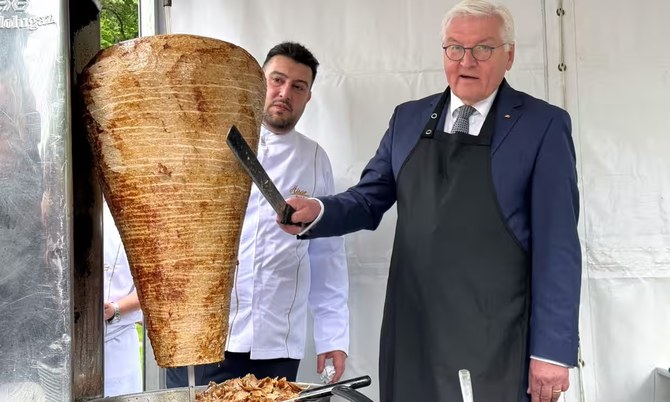
- German-Turkish say 60-kg kebab skewer brought from Germany in diplomatic mission reduces community’s contributions to stereotypical image
LONDON: German President Frank-Walter Steinmeier’s visit to Turkiye this week has stirred controversy after he brought along a 60-kg kebab skewer as part of his diplomatic mission.
Starting his three-day tour in Istanbul instead of Ankara, Steinmeier served kebabs at a reception, viewing it as a symbol of cultural exchange between the two nations.
“It is these special and intense relationships that bridge distances, and also some differences, today,” he said.
However, rather than emphasizing the close personal ties between Germans and Turks, the gesture drew criticism from many in the diaspora who viewed it as reducing their community’s contributions to a stereotypical image.
Germany, home to 2.7 million people of Turkish descent, welcomed hundreds of thousands of workers in the 1960s as part of its “guest worker” program, a bilateral agreement with Ankara to address labor shortages.
Turkish-Germans took to social media to condemn what they saw as a clumsy attempt to represent their community, accusing Steinmeier of failing to take them seriously or treat them as equals.
“Turkish-Germans discovered the 1st COVID vaccine in the world; some were movie directors who won awards on behalf of Germany, numerous writers, musicians, intellectuals from Turkey call Germany home,” wrote Evren Celik Wiltse, a professor of political science, on X.
“Of all of these, the (German) president chose the kebab maker to accompany him to (Turkiye)”, she added.
Turkish-Germans discovered the 1st COVID vaccine in the world; some were movie directors who won awards on behalf of Germany, numerous writers, musicians, intellectuals from Turkey call Germany home.
— Evren Celik Wiltse (@EvrenWiltse) April 22, 2024
Of all these, the president chose the kebab maker to accompany him to https://t.co/ZVMHyi48P0
Berkay Mandıracı, a senior analyst of Turkish-German heritage at the non-governmental organization Crisis Group, acknowledged that the gesture was well-intentioned but felt it was “anachronistic and reductionist.”
A well-intended gesture, I'm sure, but somehow not belonging to this age. As someone born and raised (until I was 12) in Germany, this feels anachronistic and reductionist.
— Berkay Mandıracı (@BerkayMANDIRACI) April 23, 2024
But let's not read too much into it and hope the rest of the visit will deepen Turkish-German ties https://t.co/ZjUvCLH7ES
The faux pas, which risked overshadowing the celebration of 100 years of diplomatic ties between the two nations, received the approval of Arif Keles, a third-generation kebab shop owner invited on the delegation trip by Steinmeier.
Keles, who served kebabs during the reception, described the opportunity as a “great honor.”
The dish of thinly sliced meat cooked on a vertical rotisserie was introduced to Germany by Turkish migrants.
Packed with chopped vegetables and doused with mayonnaise, the doner kebab has gained iconic status.
Local sales of the kebab total an estimated €7 billion ($7.5 billion), an immigrant success story the German presidency wanted to celebrate as an example of “how much Turkiye and Germany have grown together.”
Relations between Berlin and Ankara have been strained by various disputes, including disagreements over the Gaza conflict.
Steinmeier, visiting Turkiye for the first time since assuming office in 2017, has had a challenging relationship with Turkish President Recep Tayyip Erdogan, criticizing him for his approach to concerns about democratic norms in Turkiye.
Turkish-Germans have long spoken up about economic and social exclusion. Last year, Germany agreed to significantly ease citizenship rules to allow more dual nationals, a move welcomed by many Turkish individuals who have lived in Germany for decades.
With AFP
Controversy erupts as British MP Lee Anderson misses St. George’s Middle Eastern heritage
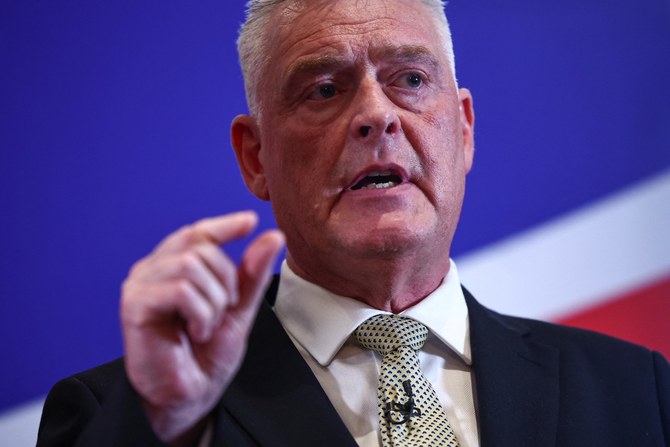
- The politician fails to acknowledge the patron saint of England’s connection to the Middle East in a video posted to celebrate St. George’s Day
LONDON: Reform UK MP Lee Anderson faced mockery after failing to acknowledge St. George’s historical ties to the Middle East in a recent social media post.
The former politician, who joined the far-right party after being suspended by the Conservatives for racist remarks about Mayor of London Sadiq Khan, shared a video on Tuesday commemorating St. George’s Day.
In it, Anderson proudly displayed red and white cufflinks matching the English flag. Also known as the St. George’s Cross, the symbol is historically associated with the Christian crusades.
“It’s St. George’s Day today and this country of ours has been a gift to the world,” Anderson said in the video.
In the accompanying caption, he wrote: “Trigger Warning. If you are a Guardian reading, advacado eating, Palestinian flag waving, Eddie Izzard supporting Vegan then this clip is probably not for your consumption.”
Anderson’s comments sparked amusement among users on X, where critics seized on his misspelling of “avocado” and highlighted the connection between Palestine and St. George, who is revered not only in England but also in parts of Africa, the Middle East, the Caucasus, and South America.
Comedian Shaparak Khorsandi quipped: “Who is going to tell him about St George’s connection to Palestine? (His mother was Palestinian, they too have a St. George’s day/feast. Though, to be fair, it is not known if he was related to Eddie Izzard),” referring to the actor/comedian.
Another user responded by sharing an image detailing facts about St. George, suggesting that if he were alive today, he would be considered an “immigrant” by Anderson’s standards, a group the Reform UK MP has repeatedly advocated should be deported.
Happy St George’s day. pic.twitter.com/Zq9cKGksOK
— GonePrivateIsh - still the same drivel (@Lairdysnr) April 23, 2024
Observed annually on the anniversary of St. George’s death with parades and marches, St. George’s Day was previously a national holiday and was once celebrated in England as widely as Christmas.
Born around AD 280 in what is now known as Cappadocia, Turkiye, St. George served as a soldier in the Roman army and fought in the crusade against Muslims. Beheaded in modern-day Palestine for refusing to renounce his Christian faith, St. George is revered by Christians, Druze and some Muslims as a martyr of monotheistic faith.
Renowned for his strength, courage and loyalty, St. George became a cherished figure in Europe and has been a symbol of English culture since the 14th century, despite never setting foot in the country.
Egypt reclaims 3,400-year-old stolen statue of King Ramses II

- Egyptian authorities spotted the artefact when it was offered for sale in an exhibition in London in 2013
CAIRO: Egypt welcomed home a 3,400-year-old statue depicting the head of King Ramses II after it was stolen and smuggled out of the country more than three decades ago, the country’s antiquities ministry said on Sunday.
The statue is now in the Egyptian Museum in Cairo but not on display. The artefact will be restored, the ministry said in a statement.
The statue was stolen from the Ramses II temple in the ancient city of Abydos in Southern Egypt more than three decades ago. The exact date is not known, but Shaaban Abdel Gawad, who heads Egypt’s antiquities repatriation department, said the piece is estimated to have been stolen in the late 1980s or early 1990s.
Egyptian authorities spotted the artefact when it was offered for sale in an exhibition in London in 2013. It moved to several other countries before reaching Switzerland, according to the antiquities ministry.
“This head is part of a group of statues depicting King Ramses II seated alongside a number of Egyptian deities,” Abdel Gawad said.
Ramses II is one of ancient Egypt’s most powerful pharaohs. Also known as Ramses the Great, he was the third pharaoh of the Nineteenth Dynasty of Egypt and ruled from 1279 to 1213 B.C.
Egypt collaborated with Swiss authorities to establish its rightful ownership. Switzerland handed over the statue to the Egyptian embassy in Bern last year, but it was only recently that Egypt brought the artefact home.
A Nigerian chess champion is trying to break the world record for the longest chess marathon
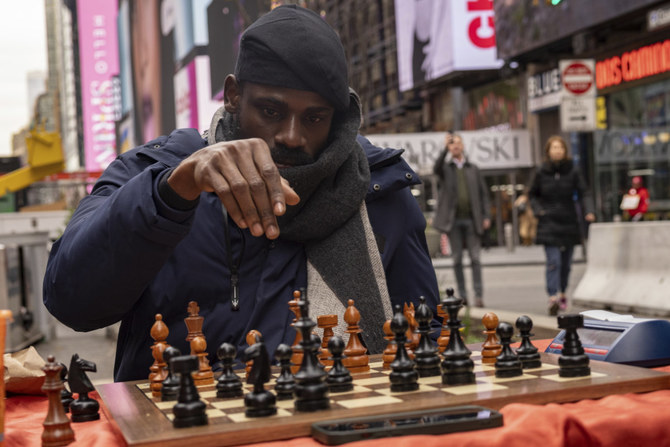
- Tunde Onakoya, 29, is playing against Shawn Martinez, an American chess champion, in line with Guinness World Record
- Onakoya, who founded Chess in Slums Africa, hopes to raise $1 million for children’s education across Africa
NEW YORK: A Nigerian chess champion and child education advocate is attempting to play chess nonstop for 58 hours in New York City’s Times Square to break the global record for the longest chess marathon.
Tunde Onakoya, 29, hopes to raise $1 million for children’s education across Africa. He is playing against Shawn Martinez, an American chess champion, in line with Guinness World Record guidelines that any attempt to break the record must be made by two players who would play continuously for the entire duration.
Onakoya had played chess for 42 hours by 10:00 a.m. GMT on Friday. Support is growing online and at the scene, where a blend of African music is keeping onlookers and supporters entertained amid cheers and applause.
The current chess marathon record is 56 hours, 9 minutes and 37 seconds, achieved in 2018 by Hallvard Haug Flatebø and Sjur Ferkingstad, both from Norway.
The record attempt is “for the dreams of millions of children across Africa without access to education,” said Onakoya, who founded Chess in Slums Africa in 2018. The organization wants to support education of at least 1 million children in slums across the continent.
“My energy is at 100 percent right now because my people are here supporting me with music,” Onakoya said Thursday evening after the players crossed the 24-hour mark.
On Onakoya’s menu: Lots of water and jollof rice, one of West Africa’s best known dishes.
For every hour of game played, Onakoya and his opponent get only five minutes’ break. The breaks are sometimes grouped together, and Onakoya uses them to catch up with Nigerians and New Yorkers cheering him on. He even joins in with their dancing sometimes.
A total of $22,000 was raised within the first 20 hours of the attempt, said Taiwo Adeyemi, Onakoya’s manager.
“The support has been overwhelming from Nigerians in the US, global leaders, celebrities and hundreds of passersby,” he said.
Onakoya’s attempt is closely followed in Nigeria where he regularly organizes chess competitions for young people living on the streets to boost his cause. More than 10 million children are out of school in the West African country — one of the world’s highest rates.
Among those who have publicly supported him are celebrities and public office holders, including Nigeria’s former Vice President Yemi Osinbajo, who wrote to Onakoya on X, formerly Twitter: “Remember your own powerful words: ‘It is possible to do great things from a small place.’“
The Guinness World Record organization has yet to publicly comment about Onakoya’s attempt, which could reach 58 hours by midnight on Friday. It sometimes takes weeks for the organization to confirm any new record.






